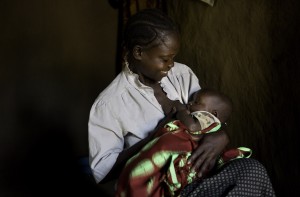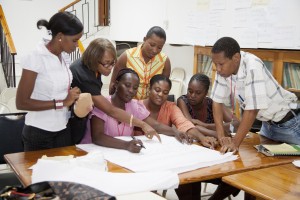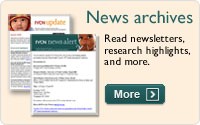
USAID's Infant & Young Child Nutrition Project
Increasing HIV-free survival for the next generation

Exclusive breastfeeding during a child’s first six months not only reduces the risk of HIV transmission, compared to breastfeeding along with giving other foods and fluids, it also improves a child’s overall health and chances of survival.
Yet, in response to the HIV epidemic, mixed messages have led to confusion around how HIV-positive mothers should feed their infants. Lacking up-to-date guidelines, tools, and training, health providers commonly give inaccurate and potentially harmful feeding advice to these mothers. As a result, some mothers stop breastfeeding altogether, while others practice mixed feeding before six months—leaving their babies more vulnerable to illness and disease.
Our efforts to strengthen infant feeding and HIV policies and programs emphasized the importance of achieving HIV-free survival—ensuring prevention of mother-to-child transmission of HIV (PMTCT) while also increasing a child’s chance of surviving and leading a healthy life.
Following the 2009 introduction of the World Health Organization’s (WHO) Rapid Advice on HIV and Infant Feeding and accompanying 2010 guidelines, we encouraged countries to select a single national recommendation for mothers based on the new WHO guidance—breastfeeding with antiretroviral interventions or formula feeding.
We also focused on building the capacity of health workers to strengthen nutritional support for HIV-positive mothers. These efforts resulted in dramatic shifts in national breastfeeding policies and critical improvements in provider practices that are contributing to increased HIV-free survival for the next generation.
Improving nutrition counseling for HIV-positive mothers in Haiti
 In Haiti and several other countries, we found that health workers commonly misunderstood the purpose of the early infant diagnosis test for HIV and counseled HIV-positive mothers to stop breastfeeding when they received a negative test result. To address the problem, IYCN developed a unique training module on counseling surrounding early infant diagnosis of HIV, trained health workers at two health facilities, and created a supportive supervision system to follow up with training participants.
In Haiti and several other countries, we found that health workers commonly misunderstood the purpose of the early infant diagnosis test for HIV and counseled HIV-positive mothers to stop breastfeeding when they received a negative test result. To address the problem, IYCN developed a unique training module on counseling surrounding early infant diagnosis of HIV, trained health workers at two health facilities, and created a supportive supervision system to follow up with training participants.
Although health workers were reluctant to change their practices at first, many said they were able to provide more appropriate counseling on breastfeeding following the training. Most significantly, health providers who had previously counseled mothers to stop breastfeeding upon receiving a negative result said they began encouraging mothers to continue breastfeeding in order to keep their children healthy and increase their chances of surviving free of HIV.
Highlights
- In ten countries, IYCN integrated nutrition assessment, counseling, and support into HIV programs, including PMTCT, orphans and vulnerable children (OVC), and pediatric AIDS services. In Côte d’Ivoire, for example, mothers received high-quality nutrition services from trained health care providers in 92 PMTCT sites and ten pediatric care and support centers.
- IYCN worked with ten countries to develop and distribute local training and social and behavior change communication tools for promoting HIV-free survival. Notably, we assisted national stakeholders in Côte d’Ivoire, Lesotho, Nigeria, and Zambia in adapting WHO’s Infant and Young Child Feeding Counselling: An Integrated Course, designed to give health providers the competencies to conduct counseling in breastfeeding, HIV and infant feeding, and complementary feeding.
- In Kenya, the project reached more than 34,000 community members in Western Province by training HIV peer counselors to integrate nutrition messages into their existing community-based activities, such as home visits and health talks with HIV-positive mothers and their families.
- IYCN trained 280 social workers and community stakeholders and equipped 30 social centers to provide nutrition assessment, counseling, and support for OVC in Côte d’Ivoire.
Photo: PATH/Evelyn Hockstein, Ayiti Foto

